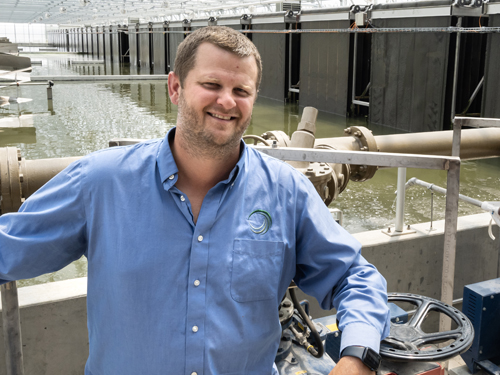Gross-Wen Technologies developed a system to make treating wastewater greener — literally — with algae.
Martin Gross knows the power of algae.
The green gunk that collects on pond surfaces changed his life and inspired a business that’s helping municipalities and the environment.
A ‘green’ partnership
While an Iowa State undergraduate with an interest in algae, Gross met Zhiyou Wen, who had recently joined the faculty and was doing research on algae. Wen — now the William K. Deal Agricultural Innovation Professor, professor in food science and human nutrition, and director of Iowa State’s Center for Crops Utilization Research — immediately hired the eager young man for his team.
The two developed a method to grow algae on conveyor belts with the aim of turning the resulting biomass into biofuel. While this proved not to be cost-effective, they soon learned that cities were looking for ways to recover harmful chemicals from wastewater.
Algae to the rescue
Algae has a big benefit over conventional bacterial- or chemical-based wastewater treatment methods because of its sustainability. It also soaks up nitrogen and phosphorous, which might otherwise enter waterways and threaten human and wildlife health.
With a new focus on wastewater treatment, Gross and Wen wanted to launch a business. Their timing was good, as Iowa State’s Startup Factory was just getting up and running. Gross was one of the first to join, learning from experienced professionals about how to turn an innovation into a viable business venture.
“You have people doing innovative work at places like Iowa State, but they don’t have a lot of training in how to start a business. The Startup Factory was a great introduction,” Gross says. “You learn what you need to care about as well as the structure for talking to customers and learning why they would buy your system. Going through that effort and putting some structure behind it was the most important part of that program.”

—Martin Gross
The infrastructure to innovate
In business for nearly a decade, Gross-Wen Technologies’ system in used around the world, and they produce a slow-release fertilizer from the algae biomass that is collected.
Their biofuel ambitions didn’t die, though. Recently, the company announced a partnership with a major corporation to develop sustainable aviation fuel from algae biomass.
“Whether it’s the Startup Factory or other programs, Iowa State has great resources to advance technology development,” Gross says. “It probably wasn’t that way when I started as a student, but now the infrastructure is highly developed to innovate and deploy new technologies coming out of research from across the university.”



